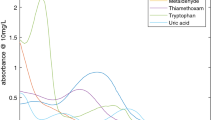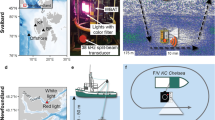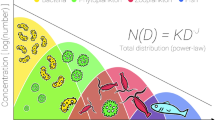Abstract
IT has been shown that at wave-lengths less than 230 mµ., the absorbency of sea water is about double that of a solution containing the same concentration of inorganic salts1,2. We ascribe the difference to the presence of organic matter which may be the same as the blue-absorbent substances named “Gelbstoff” by Kalle3. We have found regional differences in the east Atlantic and English Channel, high ultra-violet absorbencies usually being characteristic of coastal water2. This property may be used in hydrographic surveys, and for this purpose we have measured the absorbencies of filtered samples at 220 mµ, using a 10-cm. cuvette in a Unicam S.P.500 spectrophotometer.
This is a preview of subscription content, access via your institution
Access options
Subscribe to this journal
Receive 51 print issues and online access
$199.00 per year
only $3.90 per issue
Buy this article
- Purchase on Springer Link
- Instant access to full article PDF
Prices may be subject to local taxes which are calculated during checkout
Similar content being viewed by others
References
Chanu, J., Rev. Opt. (théor. instrum.), 38, 569 (1959).
Armstrong, F. A. J., and Boalch, G. T., J. Mar. Biol. Assoc. U.K., 41, 591 (1961).
Kalle, K., Ann. Hydrog. (Berl.), 65, 276 (1937).
Author information
Authors and Affiliations
Rights and permissions
About this article
Cite this article
ARMSTRONG, F., BOALCH, G. Ultra-violet Absorption of Sea Water. Nature 192, 858–859 (1961). https://doi.org/10.1038/192858b0
Issue Date:
DOI: https://doi.org/10.1038/192858b0
This article is cited by
-
Algal allelopathy
The Botanical Review (1994)
-
Effect of juglone on freshwater algal growth
Journal of Chemical Ecology (1989)
-
Colour, ultraviolet absorbance and salinity of the surface waters off the west coast of Ireland
Nature (1978)
Comments
By submitting a comment you agree to abide by our Terms and Community Guidelines. If you find something abusive or that does not comply with our terms or guidelines please flag it as inappropriate.



